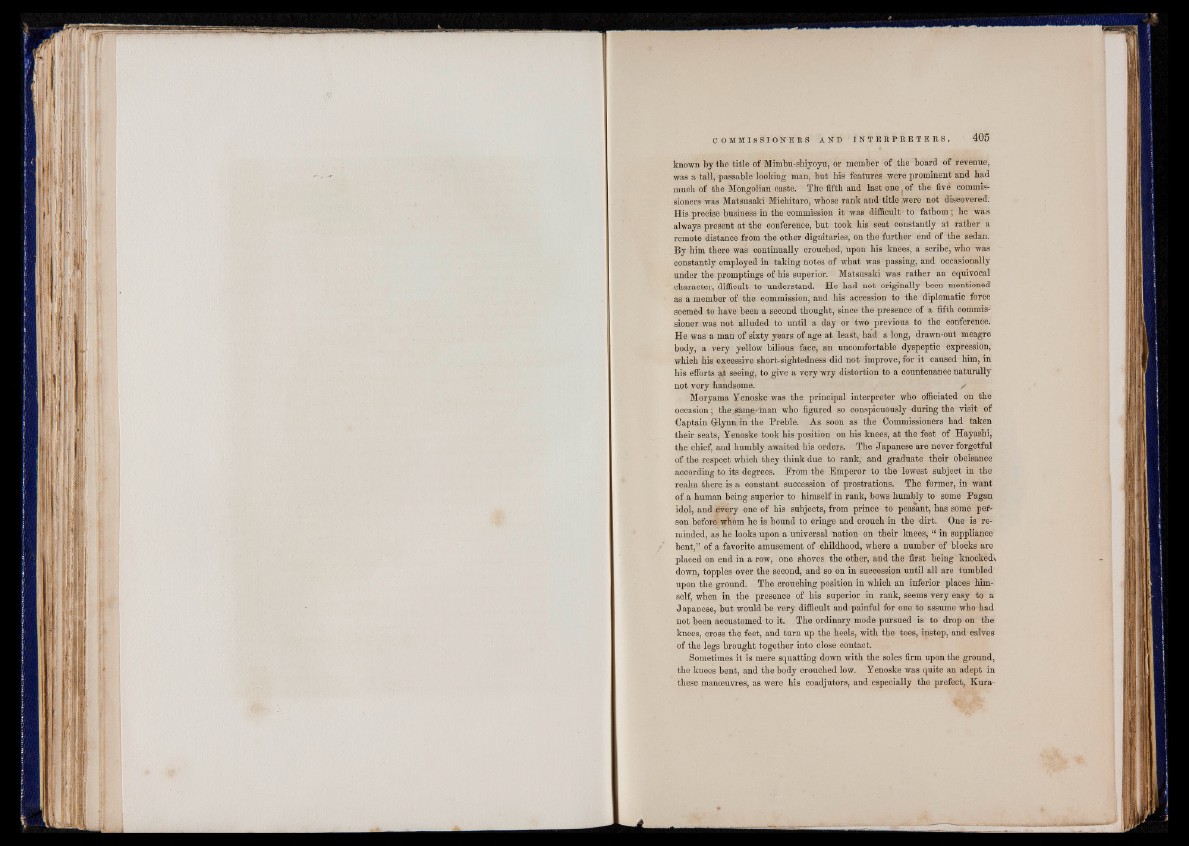
known by the title of Mimbu-shiyoyn, or member of the board of revenue,
was a tall, passable looking man, but bis features were prominent and had
much of the Mongolian caste. The fifth and last one of the five commissioners
was Matsusaki Miehitaro, whose rank and title .were not discovered.
His precise business in the commission it was difficult to fathom ; he was
always present at the conference, but took his seat constantly at rather a
remote distance from the other dignitaries, on the further end of the sedan.
By him there was continually crouched, upon his knees, a scribe, who was
constantly employed in taking notes of what was passing, and occasionally
under the promptings of his superior. Matsusaki was rather an equivocal
character, difficult to understand. He had not originally been mentioned
as a member of the commission, and his accession to the diplomatic force
seemed to have been a second thought, since the presence of a fifth commissioner
was not alluded to until a day or two previous to the conference.
He was a man of sixty years of age at least/ had a long, drawn-out meagre
body, a very yellow bilious face, an uncomfortable dyspeptic expression,
which his excessive short-sightedness did not improve, for it caused him, in
his efforts a,t seeing, to give a very wry distortion to a countenance naturally
not very handsome. y
Moryama Yenoske was the principal interpreter who officiated on the
occasion ; the Kam/.-'Uinn who figured so conspicuously during the visit of
Captain G-lynn in the Preble. As soon as the Commissioners had taken
their seats, Yenoske took his position on his knees, at the feet of Hayashi,
the chief, and humbly awaited his orders. The Japanese are never forgetful
of the respect which they think due to rank, and graduate their obeisance
according to its degrees. Prom the Emperor to the lowest subject in the
realm there is a constant succession of prostrations. The former, in want
of a human being superior to himself in rank, bows humbly to some Pagan
idol, and every one of his subjects, from prince to peasant, has some person
before? whom he is bound to cringe and crouch in the dirt. One is reminded,
as he looks upon a universal 'nation on their knees, “ in supplianee
bent,” of a favorite amusement of childhood, where a number of blocks are
placed on end in a row, one shoves the other, and the first being knocked»
down, topples over the second, and so on in succession until all are tumbled
upon the ground. The crouching position in which an inferior places himself,
when in the presence of his superior in rank, seems very easy to a
J apanese, but would be very difficult and painful for one to assume who had
not been accustomed to it. The ordinary mode pursued is to drop on the
knees, cross the feet, and turn up the heelB, with the toes, instep, and calves
of the legs brought together into close contact.
Sometimes it is mere squatting down with the soles firm upon the ground,
the knees bent, and the body crouched low. Yenoske was quite an adept in
these manoeuvres, as were his coadjutors, and especially the prefect, Kura